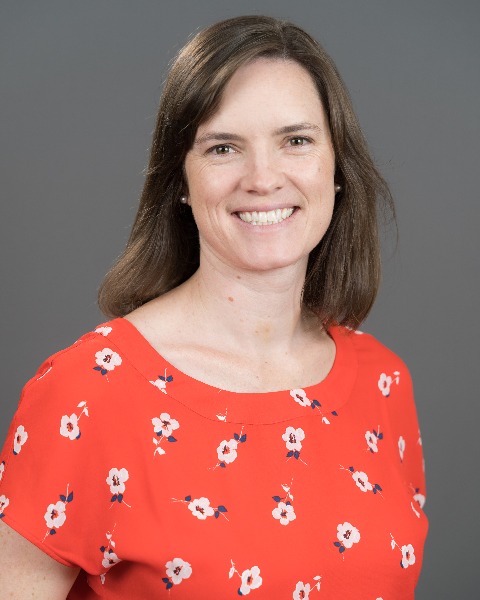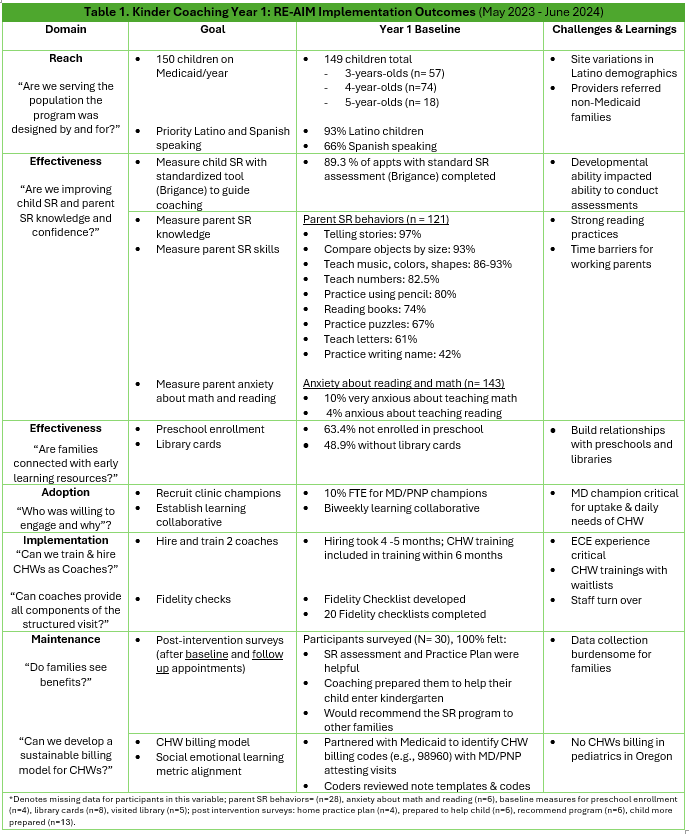General Pediatrics 3
Session: General Pediatrics 3
220 - Kinder Ready Coaching Appointments: Year 1 Implementation Outcomes using RE-AIM Framework
Sunday, April 27, 2025
8:30am - 10:45am HST
Publication Number: 220.5796
Jaime W. Peterson, Oregon Health and Science University, Portland, OR, United States; Maya Postigo, Oregon Health and Science University, Portland, OR, United States; Marlo L. McIlraith, Doernbecher Children's Hospital at Oregon Health & Science University, Portland, OR, United States; Galilea J. Estrada Sanchez, Doernbecher Children's Hospital at Oregon Health & Science University, Clackamas, OR, United States; Miriam Escobar, Doernbecher Children's Hospital at Oregon Health & Science University, FOREST GROVE, OR, United States; Sandra Silva, Oregon Health & Science University School of Medicine, Hillsboro, OR, United States; Ellen Stevenson, Oregon Health & Science University School of Medicine, Portland, OR, United States; Dawn N. Warddrip, Hillsboro Pediatric Clinic, LLC, Hillsboro, OR, United States; Katharine Zuckerman, Oregon Health & Science University School of Medicine, Portland, OR, United States

Jaime W. Peterson, MD, MPH (she/her/hers)
Associate Professor
Oregon Health and Science University
Portland, Oregon, United States
Presenting Author(s)
Background: The Kinder Ready Coaching Program was co-developed with Latino parents for preschool-aged children in primary care to address the Latino school readiness (SR). The program includes two structured, individualized parent-child SR coaching sessions for 3- 5-year-olds with a bilingual community health worker (CHW).
Objective: Evaluate implementation of The Kinder Ready Coaching Program in two Oregon pediatric clinics using RE-AIM framework.
Design/Methods: Implement a Kinder Ready Coaching Program in two pediatric clinics serving Latino children. Coaching session provides SR knowledge, assesses child SR with a standard tool (Brigance), models skills for home practice and connects families to early learning resources. Collect child and parent SR measures at baseline and assess implementation using the RE-AIM framework (Reach, Effectiveness, Adoption, Implementation, Maintenance). Baseline descriptive statistics completed for child, parent, and implementation outcomes (Table 1).
Results: Reach: Enrolled 149 primarily Latino, Spanish-speaking families (priority population) at two clinic sites. Effectiveness: Child SR, parent SR, and anxiety teaching math & reading were measured in most baseline visits (89%, 81%, 95%). Most children were not in preschool (64.4%), only 50% had an active library card and parents had more anxiety regarding teaching math than reading (10% vs 4%). Adoption: Clinic champions provided 1:1 support to coaches and clinic staff. Biweekly learning collaboratives with coaches for ongoing training and support topics. Implementation: Hired and trained two coaches at two clinics, funded CHW training; designed and implemented fidelity checks (n=20) to ensure intervention quality and adherence. Maintenance: Parent surveys after two sessions (N= 30) revealed positive program experiences. A billing model was developed and implemented with Medicaid partners for sustainability. Challenges included unexpected coaching staff turnover in year 1. Key learnings include coaches need both early childhood education and Spanish skills to build trust with target population.
Conclusion(s): Latino parents had high participation in individualized SR coaching embedded into primary care. Our team was able to reach many Latino children with successful uptake, adoption, and implementation in year 1. Key effectiveness measures for pre/post analysis were collected concurrently and a billing model has been developed for long-term sustainability.
Table 1. Kinder Coaching Year 1: RE-AIM Implementation Outcomes (May 2023 - June 2024)


